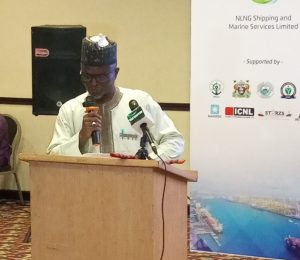NSC Pushes for Harmonized Maritime Regulation to Boost Trade, Global Logistics Performance Rankings

The Nigerian Shippers’ Council (NSC) has reaffirmed its call for the establishment of a standardized regulatory framework in Nigeria’s port and maritime sector, in order check inefficiencies, overlapping mandates, and rising logistics costs which are critical threats to national competitiveness.
The Executive Secretary/CEO Pius Akutah, represented by Mr. Moses Abere Acting Director, Special Duties made the call while speaking at the 2025 Conference of the Association of Maritime Journalists of Nigeria (AMJON), held in collaboration with NLNG Shipping and Marine Services Limited at Sheraton Hotel, Ikeja, Lagos, adding that Nigeria’s poor showing in the World Bank’s 2023 Logistics Performance Index (LPI) — ranking 130th out of 139 countries is linked to an outdated and fragmented regulatory environment.
However, the Deputy Director, Regulatory Service, Nigeria Shippers Council, Ibrahim Muhammed made the paper presentation on behalf of the Council and explained that multiple port agencies including the NPA, NIMASA, Nigeria Customs, and others operate in silos, leading to duplicated inspections, delayed cargo clearance, and high corruption risk.
“A functional port is not possible without a unified and transparent regulatory system. Trade cannot thrive in an environment of overlapping commands,” the Council stated.
The NSC citing a 2022 report by the Nigerian Economic Summit Group, disclosed that 49% of delays at Nigerian ports result from conflicting agency procedures and manual operations.
It added that while a few agencies like NSC and Customs have begun digitizing processes, others continue to rely heavily on paper-based documentation.
The United Nations Conference on Trade and Development (UNCTAD) also recorded that 70% of African ports face similar delays, but countries like Ghana, Morocco, and Singapore have successfully turned the tide by deploying integrated digital systems.
The Council proposed a seven-point reform strategy to resolve the crisis:Institutional Realignment: Harmonize roles among NSC, NPA, and Customs to eliminate duplication.
Digital Integration: Launch a Port Community System (PCS) connecting all stakeholders; expand e-Manifest and cargo tracking platforms.
Human Capital Development: Continuous training for compliance officers and regulators in partnership with UNCTAD and the World Bank.
Stakeholder Engagement: Quarterly roundtables with shippers, terminal operators, freight forwarders, and exporters.
Performance Monitoring: Monthly publication of port KPIs including dwell time, clearance time, and compliance scores.
Dispute Resolution: Proposal for a Maritime Economic Tribunal to fast-track conflict resolution within 21 days.
Legislative Reform: Passage of the Nigerian Ports Economic Regulatory Authority (NPERA) Bill, which will empower NSC to enforce standards, regulate tariffs, and drive competition.
“The NPERA Bill, if passed, could reduce regulatory duplication by 40%, lower port charges by up to 20%, and improve investor confidence by 31%,” the Council decleared.
Case studies from across Africa and Asia show clear pathways for Nigeria to emulate:
Ghana’s ICUMS increased revenue by 34% and halved clearance times.
Morocco’s PortNet slashed transaction times from 16 to 7 days.
Singapore’s Unified Maritime Authority helped it top the global LPI rankings.
The NSC advised that Nigeria must act quickly to integrate with AfCFTA trade protocols, or risk becoming a weak link in the continent’s trade corridor.
The NSC highlighted that maritime regulatory reform is no longer optional but an economic necessity.
The Council quoted from UNCTAD’s 2022 maritime outlook: “Where regulation is smart and efficient, trade flows. Where it is not, trade chokes.”
The NSC’s roadmap reflects a clear vision for a modern, transparent, and efficient maritime regulatory environment; hence through institutional realignment, technological investment, and inclusive governance, Nigeria can unlock its port sector’s full economic potential.
“With the right strategies, harmonized policies, digitization, stakeholder inclusiveness, and performance-driven regulation, the NSC can lead the transformation of Nigeria’s maritime regulatory architecture,” the Council emphasized.
